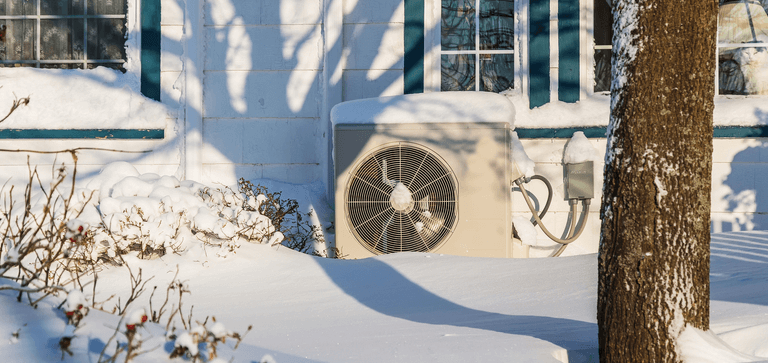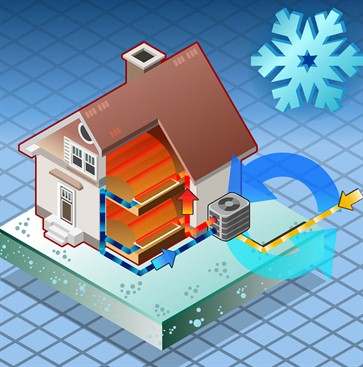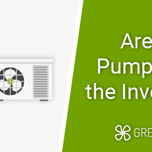
Get up to 4 quotes by filling in only 1 quick form

Slash your energy bills by installing a heat pump

We’ve helped over 500,000 homeowners reduce their carbon footprint
- GreenMatch
- Heat Pumps
- How to Defrost a Heat Pump Manually?
How to Defrost the Heat Pump Manually?
Do You Want to Know What the Heat Pump Defrost Cycle Is?

Heat pumps can often get covered by snow and ice during the winter season. Coil covered by white frost and even light ice during certain weather conditions will not significantly influence the working efficiency of your heat pump.
On the other hand, if the entire unit is iced-up, including the top of the unit and the insides of the coil for an extended period, it can cause serious damage to the equipment.
In order to avoid these problems, it is essential to address the issue as quickly as possible.
Air source heat pumps (ASHP) will naturally ice-up during the lower temperatures but will, from time to time, go into a defrost cycle to de-ice the coils and keep the running efficiency high.
If the ice blocks the coil, heat exchange between the refrigerant and the outside air cannot occur.
In this article, we will point out a few easy strategies to safely unfreeze your heat pump with only a few tools.
However, if you are concerned about the condition of your heat pump or believe you need a replacement, then it’s a good idea to get in touch with a professional as soon as possible. Finding qualified heat pump installers who are available can be a tricky and tedious task – researching and contacting installers one by one can take up hours of your free time.
Thankfully, GreenMatch can take this weight off your shoulders so you can spend your time doing something you enjoy instead. All you have to do is fill in our quick form and we’ll send you up to 3 quotes from qualified heat pump installers in your area within 48 hours.
Our service is completely free and non-binding, and you can also choose the installer who offers the best deal. Click the button below to save both time and money, and have a working heat pump again in no time!
- Quotes from local engineers
- Payment by finance available
- Save up to £1100 per year
It only takes 30 seconds



How Does the Defrost Cycle Work?
When a heat pump is iced-up, the reversing valve is energised and switches the system into the air conditioning mode. This might sound confusing, but it is right.
In fact, while the outdoor evaporator becomes the condenser, the fan shuts off. This process allows the high-pressure refrigerant to move through the outdoor coil and melt the ice. At the same time, back-up heat is generated to temper the cold air that blows out from the vents.
Immediately after the outdoor thermostat or sensor reaches a certain temperature, the system goes back to normal heating mode. The entire process lasts between 2-10 minutes, depending on the equipment.
Various heat pumps have different ways of determining when to go to the defrost mode. The newer types of equipment commonly work based on solid-state control modules with temperature sensors.
If your heat pump is often iced-up during the winter, it is possible that defrosting is not the only problem. Some of the problems that may occur can be fixed by the homeowner while others require a professional service call.
Our guide presented below will help you to unfreeze your heat pump, but please note that these are just rough guidelines and that your heating system should be inspected and repaired by the licensed technician.
Bear in mind that you should never pick ice off with a sharp object. It may cause serious damage to refrigerant coils and fins.
1. Understand the Problem
Every time when frost occurs, especially during the colder season, your equipment can ice-up. To prevent excessive deposition of ice, most of the pumps work according to temperature based defrost system.
The system runs on motorised or either electronic timer. Intervals are set differently depending on manufacturer and model of the heat pump but most commonly, these settings are 30, 60 or 90 minutes.

2. Run the Fan
Running the fan is the simplest and often the best solution to start. In most of the cases, blowing air will thaw equipment within 60 minutes.
If the outdoor temperature is extremely low, try setting up the fan on an exhaust setting.
Constant fan running will not solve the problem and freezing issues, but it is a good start and a way to keep your heat pump running.
3. Move the Sensor
When frost conditions occur, your heat pump needs to work longer in order to eliminate ice.
Intermittently, moving your thermostat on the outside portion of the unit may help to resolve the problem. If you are going for this option, make sure that you have marked the original position of the sensor so you can adequately replace it.
Contrary, a new location can be unfavourable which may cause many hours of error solving and inefficient working. It may even result in stopping the defrosting process that is opposite of the desired effect.
4. Manual Defrost
If your unit has defrosted option run, it every time when outside conditions cause freezing. The power-saving settings and defrost mode are not going hand in hand.
Additionally, they might be a reason for your frosting issue. If your defrost cycle is too short, it can cause freezing and frequent troubles for the owner. The best solution for proper clearance and ventilation is to set up your system as close as possible to the manufacturer’s specifications.
There are many heat pump benefits. Therefore, it’s crucial to make sure your heat pump is working efficiently and safely so it can reach its full potential. If you need a qualified heat pump installer to replace your heat pump, let GreenMatch help you. Just fill out our short form, and get up to 3 free quotes from suppliers in your region.
- Quotes from local engineers
- Payment by finance available
- Save up to £1100 per year
It only takes 30 seconds



 We strive to connect our customers with the right product and supplier. Would you like to be part of GreenMatch?
We strive to connect our customers with the right product and supplier. Would you like to be part of GreenMatch? 
